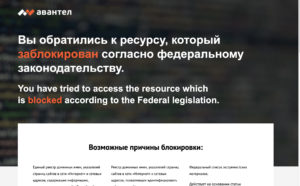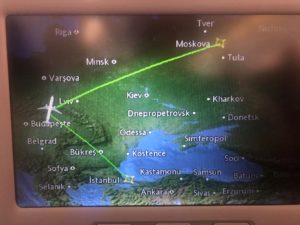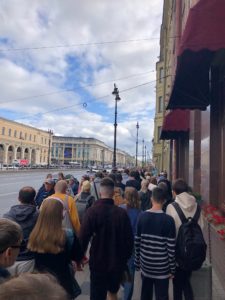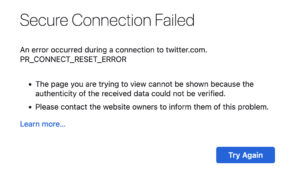 I’m interested in stories that go uncovered and undercovered. Fewer stories are less obscured today than life in Russia under Western sanctions. I’m especially interested in stories that are so imbued with spin and propaganda that the news media has abandoned all pretense of objectivity. That’s certainly true about the Russia-Ukraine conflict.
I’m interested in stories that go uncovered and undercovered. Fewer stories are less obscured today than life in Russia under Western sanctions. I’m especially interested in stories that are so imbued with spin and propaganda that the news media has abandoned all pretense of objectivity. That’s certainly true about the Russia-Ukraine conflict.
I spent last week in Moscow to check things out for myself. Now I’m in Saint Petersburg. If you’ve never been to Russia, Moscow feels a bit like D.C.—streets and plazas on a scale hostile to pedestrians, impressive metro, intimidating government buildings raised by and for the political class. Saint Petersburg is more like New York, the country’s intellectual capital, steeped in history, sophisticated and hip rather than utilitarian and brutalist.
Friends worried about my safety. Their concerns could not possibly have been more misplaced.
Some worried that I’d be detained like the WNBA player Brittney Griner, who got caught at a Moscow airport with vape cartridges containing cannabis residue yet is being portrayed as a political hostage of Vladimir Putin. I wish Griner the best and hope she doesn’t go to prison, but I don’t understand the assumption of Americans that they don’t have to obey the law when they visit a foreign country. Foreign prisons are full of Americans convicted on drug charges; American prisons host many foreign nationals. If you can’t conform to local legal norms, stay home.
I don’t vape or use cannabis so no worries there.
But I was pulled out of the passport line upon arrival and pulled into a side office. A young man I think was an FSB officer questioned me about my occupation, education, travel itinerary, politics and my opinions about Russia’s actions in Ukraine. Unlike other Western travelers from “unfriendly” countries who report having been held for hours, the officer didn’t ask to look at my phone and sent me on my way after about 20 minutes. I assume that my experience was eased by the fact that one of my cartoon clients is Sputnik News.
I’ve been through this sort of thing before. No matter the country or its culture, intelligence agents assigned to border security are cut from the same cloth everywhere you go: young, intelligent, big smiles and a certain sinister charm. The Mossad grilled me for hours at Tel Aviv airport. Same treatment by an Iranian intel dude after entering overland from Afghanistan. Don’t lie to these guys. They’ll know.
Yes, it’s legal to travel to Russia. You can still get a visa. You can still fly in, albeit not over Europe. I flew on a packed plane to Istanbul and connected to a Moscow-bound flight that detoured an extra hour or two by going around and to the west of Ukraine.
The Russian economy, Americans have been told, is a wreck. If so, it’s the biggest secret in Russia. Storefronts are occupied, bustling with shoppers like it’s the week before Christmas. Gas prices are a reasonable $3 a gallon. Highways and city streets are choking with car traffic and pedestrians. Restaurants and bars are doing brisk business. New buildings are going up. Nowhere in the nation’s two most important cities does one find deranged armies of homeless people screaming at thin air and threatening people, streets blanketed with litter and shattered and boarded-up storefronts, as are blighting New York. There was an hour-long line—on a Tuesday—to enter the Hermitage Museum in Saint Petersburg.
To be sure, sanctions are affecting the tourism business. Hotel prices have fallen as a result. Restaurants in tourist areas have been impacted as well. Westerners stopped coming when COVID began two years ago; this feels like an extension of that. So it’s not a shock.
Some Western businesses, like McDonald’s and Starbucks, have closed. Who cares, except the Russian workers who got laid off? Burger King is everywhere. As in Rome or Paris, you can score a much better cup of joe at a zillion cafes.
Nothing has made as big an impression on businesses in Russia as Visa and Mastercard’s decision to stop honoring American- and European-issued debit and credit cards in Russia. Russian nationals can use their MIR debit and credit cards here, but not in the West. When Westerners come to Russia, we have to bring a stack of cash to pay for everything, including hotels. There is a sort of workaround; I have an account at one of the major U.S. banks that still has branches here and so have been able to withdraw cash via ATM. Suze Orman would love the inability to go on a credit-card bender.
Signs of war are few and far between: the “Z” logo on some metro posters, the occasional motorist with a patriotic flag on their car, sailors in port for Navy Day.
Needless to say, the sanctions don’t affect Russian political or financial elites. All Biden and the EU are doing is making it harder for Americans and Europeans to visit Russia. This means we have no cultural impact whatsoever, no political influence. As we’ve been doing in Cuba and Iran for decades, we’re cutting off our noses to spite our faces.
Google, or Google News at least, is supposedly blocked in Russia. Not true.
Twitter, Facebook and Instagram, all officially blocked by the Russian government, actually come and go in some mysterious, haphazard way.
My email is blocked.
Russia allows a lot of Western media outlets, including those highly critical of Russia and its war in Ukraine, to broadcast inside the country. I watched pro-Ukraine, anti-Russian stories here on CNN International, CNBC and the BBC. Western news apps like the New York Times, Washington Post, The Guardian and the Associated Press work without a hitch. However, and oddly, my syndicate’s cartoon website GoComics is inaccessible in Russia.
In the United States, on the other hand, the powers-that-be are blocking apps of the TV and radio broadcasters RT and Sputnik News, as well as their text journalism content. Both networks are banned in the EU. By this metric, Russia’s news media is freer than ours.
Many of my friends worried that Russians would respond with rage and violence when they learned I was from the United States. I know from my travels that Americans’ inability to separate people from the politics of their country’s government is fairly unique and so shrugged them off.
But Russians’ reactions have surprised me. Outwardly glum and cold until they get to know you, they warm up with big bright smiles and express happy surprise that anyone from the United States still takes interest in Russia. Drinks are comped, good vibes all around.
(Ted Rall (Twitter: @tedrall), the political cartoonist, columnist and graphic novelist, co-hosts the left-vs-right DMZ America podcast with fellow cartoonist Scott Stantis. You can support Ted’s hard-hitting political cartoons and columns and see his work first by sponsoring his work on Patreon.)



